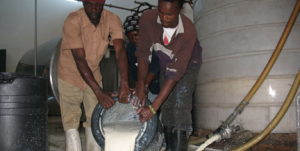In a world that is run by various forms of financing and spending, countries are continuously dependent on institutions that provide for their ability to develop. And in a reality where even highly developed countries like the US, UK, and Germany are millions of dollars in debt, is it really surprising that developing countries are even more heavily dependent on institutions that offer loans?
Finances and development are quite complicated, however. Talking taxes, interest, and other money related matters are confusing to you and me as everyday citizens. So we sit back and let governments and the institutions with the fancy names – like the International Monetary Fund (IMF) and World Bank – handle the finances. But…Money runs the world! I’ve (unfortunately) learned that you can rarely talk about anything these days without having the conversation return to how money works (or doesn’t work in some cases).
While richer countries are able to continue functioning even in the throes of high debt, developing countries like Jamaica lack the GDP (gross domestic product) and infrastructure to sustain themselves. Infrastructure sounds like such an overwhelming word, but it’s actually a surprisingly basic concept that may be the most important thing to focus on in developing countries. For Jamaica to make good use of its loans, it needs the basic necessities of any stable society. In other words, infrastructure encompasses building schools to educate the people, roads and transportation, and hospitals. So in theory, monetary institutions like the IMF and World Bank thus operate to provide loans to spur economic growth. Since the 1960s, Jamaica has been relying on funds from the IMF and World Bank in hopes that education, health and jobs will increase, and poverty will be eradicated. However, as we have previously seen from Julia’s post on eradicating illicit crops, it is apparent that noble causes do not always yield positive effects. Without sufficient investment in infrastructure, a future of self-sufficiency cannot exist.
Throughout the history of IMF and World Bank policies in Jamaica, there have been situations like the heart-wrenching stories of local farmers pouring out gallons upon gallons of fresh milk from their dairy farms as a result of “development” projects.  Powdered milk is subsidized and much cheaper than fresh, locally produced milk. These dairy farmers now have no way of supporting themselves and are forced to shut down. This wreaks havoc on the economy and creates more instability, for Jamaican farmers have no way of competing with the cheap products that are being imported daily. Acres of banana trees fester with fruit that cannot be sold because the liberalization standards of these financial institutions enforce mandatory free trade policies, propounding the notion that free trade will inevitably bring prosperity. Unfortunately, Jamaicans are feeling anything but prosperous these days. They can do little to combat these adverse effects, for if Jamaica does not adhere to the terms laid out by monetary institutions, then they will cease to receive still much needed funding. In actuality, these economic conditions are destructive towards agricultural development, which is sad given Jamaica’s naturally rich and diverse agricultural background.
Powdered milk is subsidized and much cheaper than fresh, locally produced milk. These dairy farmers now have no way of supporting themselves and are forced to shut down. This wreaks havoc on the economy and creates more instability, for Jamaican farmers have no way of competing with the cheap products that are being imported daily. Acres of banana trees fester with fruit that cannot be sold because the liberalization standards of these financial institutions enforce mandatory free trade policies, propounding the notion that free trade will inevitably bring prosperity. Unfortunately, Jamaicans are feeling anything but prosperous these days. They can do little to combat these adverse effects, for if Jamaica does not adhere to the terms laid out by monetary institutions, then they will cease to receive still much needed funding. In actuality, these economic conditions are destructive towards agricultural development, which is sad given Jamaica’s naturally rich and diverse agricultural background.
The lack of country-specific policies has hindered the stabilization of economies, and has rendered the IMF sometimes ineffective at the realization of its own goals. Many monetary policies seek only to correct problems for the short run and do not create comprehensive enough programs that take long-term issues into consideration. What we are witnessing is a tendency towards “one size fits all” economic policies, which is no way to effectively create change and positive development. These policies were initially created to decrease instability and foster growth, but this has not happened. Instead Jamaica has fallen into nearly 40 years of tumultuousness.
Unrealistic goals of monetary institutions are often complicated by the lack of knowledge of socio-cultural factors that may impact project success; we cannot simply expect that free trade will automatically bring success. So what can be done to combat this? While free markets have benefited some developing countries in the past, diversity of individual countries must be addressed. Jamaica is a prime example of a country that does not have the existing infrastructure or social structure to support such drastic change. I would love to see the coupling of fewer liberalization measures with some trade protections still in place. For example, if powdered milk ceased being imported to Jamaica, many local dairy farms would reopen for business and provide a fresh start in self-sufficiency and the job market. As I mentioned before, holding a “one size fits all” attitude wouldn’t be very beneficial to the people of Jamaica.
A great eye-opening documentary on the adverse effects of IMF and World Bank economic aid in Jamaica can be seen in Life and Debt. The dangers of having too strong a focus only on the economy are highlighted, and we witness how strict and inflexible standards can end up displacing local efforts toward what could have been self-sufficiency.



2 pings